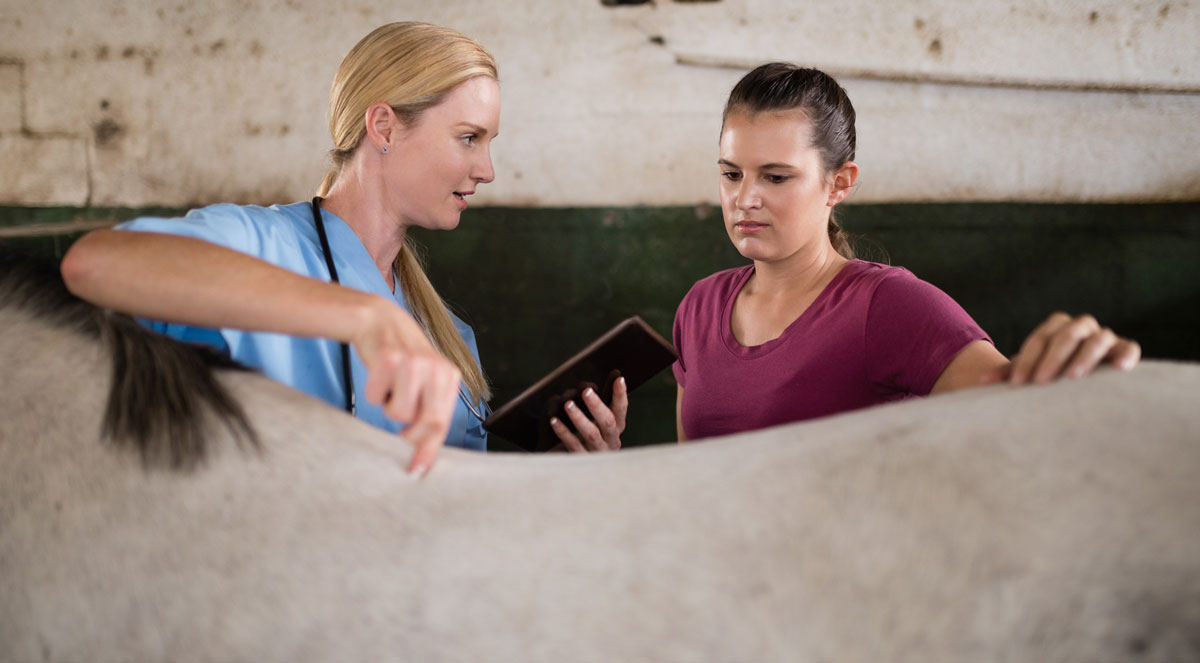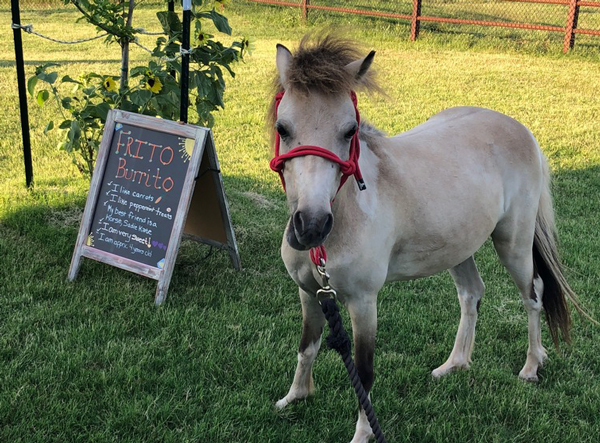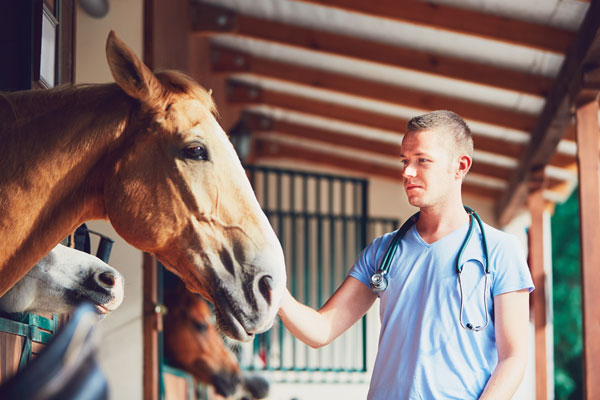
Giving health advice on a horse that you haven’t seen, especially if you are not a veterinarian, can be dangerous for the horse, and open you up to legal liability. Many conditions look like other conditions. Therefore a horse really needs to be examined by a local veterinarian. Photo by Wave Break Media/Shutterstock
Facebook groups and other online platforms have become common places to seek advice on all types of subjects, even veterinary advice for horses. Unfortunately, giving and receiving equine advice of a medical nature can be harmful to your horse, and giving advice may be illegal, even if the person providing the advice is an equine veterinarian.
A Layperson’s Advice
Should a layperson give someone veterinary advice online?
“Whether we like it or not, this happens all the time,” says Julie I. Fershtman, an attorney at Foster Swift Collins & Smith, PC. “Just visit any online chat group or bulletin board, and you’ll find people freely offering advice on legal matters in addition to veterinary matters. Misinformation abounds.”
Fershtman has been a lawyer for 35 years. Her law practice includes equine law, and she’s represented veterinarians in malpractice cases. Fershtman is also the author of the new, multiple award-winning American Bar Association book Equine Law and Horse Sense.
She explains that if the people offering information make it clear that they aren’t veterinarians but are simply sharing comments based on their own experience, then it’s probably acceptable. However, she strongly suggests laypeople take great caution when offering veterinary advice to others online.
“Readers might wrongly assume the writer really is a veterinarian, when he or she is not,” cautions Fershtman. “The safest approach is to not provide any online professional advice. If you’re going to offer commentary on a veterinary matter, such as how to respond to a minor colic situation as it’s occurring, it’s best to clearly disclose that you’re not a veterinarian and that you’ve never attended veterinary school, but you’re merely offering an idea that has worked for you a couple of times, in your own experience.”
Mike J. Schoonover, DVM, MS, Dipl ACVS-LA, Dipl. ACVSMR, is an associate professor of Equine Surgery and Sports Medicine at Oklahoma State University’s College of Veterinary Medicine. Schoonover is board certified in large animal and equine sports medicine/rehabilitation, and he agrees that it really depends on the kind of advice people are giving.
“Diagnosing disease, recommending specific treatments or suggesting prescription medications could be interpreted as ‘practicing veterinary medicine without a license.’ This is against the State’s Veterinary Practice Act and against the law,” Schoonover warns. “Individuals could be fined or even face jail time … even if they don’t live in that state.”
“Every state has a Veterinary Practice Act,” continues Schoonover, “and they all have some specific differences. Which Practice Act applies depends on where the horse is located. Thus, someone living in Oklahoma giving treatment advice for a horse located in Texas could be in violation of the Texas Veterinary Practice Act. However, giving general advice, not specific to a particular horse, isn’t in violation of the Practice Act.”
Sarah le Jeune, DVM, Dipl. ACVS, Dipl. ACVSMR, CVA, CertVetChiro, is a professor of Equine Integrative Sports Medicine and Rehabilitation at the University of California-Davis School of Veterinary Medicine. Le Jeune also agrees.
“If a layperson is giving information about a specific condition, they’re diagnosing,” she says. “That’s practicing without a license, which is very problematic from a legal standpoint. It can also lead a horse owner astray and waste precious time in getting adequate treatment.”
Potentially Dire Consequences
Kris Hiney, Ph.D., is an assistant professor and equine extension specialist for the Oklahoma State University Department of Animal and Food Sciences. She received her Ph.D. in Animal Science with an emphasis on equine exercise physiology from Michigan State before joining the faculty at OSU.
One of Hiney’s primary concerns about non-vets giving medical advice online is that many conditions look similar but have very different underlying causes. She emphasizes that veterinarians are trained in the full range of diseases and disorders affecting horses, but individual horse owners have much more limited experience in the number of horses they’ve seen and disorders they’ve encountered.
“Choose your information source wisely,” cautions Hiney. “Veterinarians and Ph.D.s have trained extensively and have the breadth and scope of knowledge to make informed decisions. They also understand how to read the original research, look at study designs, and truly understand whether the information is applicable to a particular horse.”
Schoonover agrees. “A non-veterinarian likely doesn’t have the intricate medical knowledge required to accurately diagnose a condition or disease,” he says. “A lot of diseases and/or ailments can have very similar symptoms. Additionally, a lot of conditions described by horse owners aren’t actual diseases. For instance, lameness and colic aren’t diseases, they’re clinical signs that can have a multitude of causes.”
He explained that “a veterinary evaluation, which often includes diagnostic tests, such as x-rays or bloodwork, is needed to sort through all the potential causes to make a specific diagnosis. A non-veterinarian tends to focus on the one cause they’re most familiar with and provides advice, which may not be relevant to the actual cause in that specific horse. Getting inaccurate advice could delay appropriate treatment, which may be detrimental to the health of the horse.”
Le Jeune adds that when people follow the wrong advice, they may end up with an even bigger problem. “If you’re dealing with something that time is of the essence like colic, puncture wounds or eye injuries, it’s very risky to waste time following online advice and potentially allow the prognosis to worsen,” she says.
“If the advice given isn’t relevant to the horse’s condition,” says Schoonover, “best case scenario, it doesn’t help but causes no harm. Or the advice could be detrimental and cause the condition to worsen or cause a new problem altogether. Depending on the condition, delaying appropriate treatment, even for a few hours, could allow progression of the condition, which could have serious consequences, such as permanent organ damage, chronic lameness or even death of the horse. Bad advice could end up costing the horse owner more in veterinary expenses and/or lead to loss of use of the horse.”
Veterinary Advice Online
Hiney provides equine nutrition advice online, but if someone really needs her help, she says she needs to see the animal and the pasture and have the feed report to give accurate advice. Otherwise, she can only provide general guidance. She believes that even veterinarians should still be careful about providing advice online.
“Most veterinarians will qualify opinions with a statement that they haven’t examined the horse,” says Hiney. “The hands-on experience and eyes on the animal are essential. With that said, many veterinarians do consult with another on more difficult cases, and with shared diagnostic information.”
Le Jeune adds that during COVID-19, veterinarians did plenty of telemedicine, but agreed that it’s always best to see the animal in the flesh to fully understand what they’re dealing with.
“When you’re speaking with a person who isn’t a vet,” she says, “it can muddy the waters, because they can’t provide really useful information about the horse’s condition to establish a diagnosis. This makes it extremely dangerous for a vet to provide specific advice, and I would advise against it.”
Schoonover says he wouldn’t provide online advice without an established Veterinarian-Client-Patient Relationship (VCPR), which means he’s previously examined the animal and/or has assumed responsibility for making medical judgments regarding the animal’s health.
“When I have clients contact me through social media,” says Schoonover, “rather than respond to them on the platform, I will call them to discuss the issue they’re having so that I can ask the right questions and allow them to describe the problem in more detail. I will always recommend an examination prior to giving any advice, but if that isn’t possible, and I have a valid VCPR, I may make or change treatment recommendations for existing problems.”
He adds that as a veterinarian licensed only in Oklahoma, he can’t give veterinary advice that includes diagnosis or treatment for a horse located in another state. Unless he’s consulting with a veterinarian licensed in the horse’s state, it would still be considered practicing without a license.
“Legal ramifications for the professionals can include injunctions brought against them seeking to stop them from providing professional services in states where they aren’t licensed,” says Fershtman. “Potentially, professionals who practice where they aren’t licensed could face challenges to their licenses, such as reprimands, suspensions or revocations.”
Alternative Options to Online Veterinary Advice
“In difficult financial times, it’s easy, quick and free to turn to online sources for ‘advice’ that really requires paying a trained veterinarian,” says Fershtman. “My hope is that people protect themselves and avoid that temptation. If you want reliable advice, hire a knowledgeable, licensed veterinarian who can provide advice and services in your state. Develop a veterinary/patient relationship and give your veterinarian the essential details so they can provide the best assistance possible.”
With a VCPR, your vet will know your horse’s health history and may be more willing to offer advice over the phone or through email or direct messaging on social media. Some practices may offer a chat or online appointment scheduling; however, they likely won’t offer advice specific to a particular horse without a valid VCPR, says Schoonover.
If you want to look for information online, Hiney suggests contacting a university with faculty specifically trained in equine. Le Jeune also recommends visiting websites of equine clinics with a library of information on specific conditions. However, if you have any questions, she said to get on the phone and call a vet.
“Instead of spending time surfing the web and potentially getting wrong information, talk to your veterinarian,” says le Jeune. “We [UC Davis School of Vet Med] have an advice line that people can call and ask questions. We can give broad advice for general questions, but the conclusion is always to have your vet look at the horse. If the animal is sick, especially if it’s an acute sickness, it’s always better to have it evaluated. Once an animal has an ailment, it needs to see their vet.”
Schoonover also suggests visiting the websites of veterinary colleges and private equine practices with general information about specific horse diseases. He also recommends the websites of organizations like the American College of Veterinary Surgeons and the American Association of Equine Practitioners, which have information pages describing specific equine diseases and conditions.
“Consequently, anyone who thinks they’re getting free veterinary help simply by logging into a chat room or bulletin board could be asking for serious trouble,” concludes Fershtman. “There’s anonymity online, as compared to accountability, where people create pages with fake identities and write anything. The one posting the ‘advice’ you just found online could very well be a mischievous 13-year-old having fun.”




